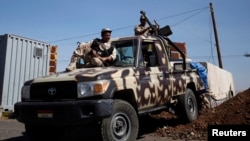SANAA —
A planned cease-fire between the Yemeni government and Shi'ite rebels failed to take effect on Monday, hours after both sides published the terms of a truce to end fighting in and around the capital Sana'a.
Security sources said clashes continued in the city of Amran in Yemen's north.
The Houthi insurgents - named after the tribe of their leader - as well as the Defense Ministry's newspaper, 26 September, posted details of the cease-fire on their websites late on Sunday.
But a local official said it had yet to go into effect.
“What was published in the media as a cease-fire is in actual fact just a vision of how to end the war,” Ahmed al-Bekry, deputy governor of Amran said on his facebook page, adding that neither the military nor the Shi'ite Houthi rebels had signed the deal.
Since the breakdown last week of a previous truce reached at the beginning of the month, government forces and allied tribesmen have struggled to halt the militants' advance on villages just 25 miles (40 km) northwest of the capital.
Policemen clashed with armed followers of the Houthi movement - named after their leader's tribe - in a standoff outside the group's political bureau in Sana'a on Saturday.
U.S.-allied Yemen, an impoverished country of 25 million that shares a long border with the world's top oil exporter Saudi Arabia has been in turmoil since 2011 when mass protests forced veteran president Ali Abdullah Saleh to step down.
At least 200 people have been killed this year in battles pitting the insurgents against the government and tribal allies.
Officials say the Houthis, who have fought short but devastating wars with government forces since 2004, are getting weapons from Iran. The rebels deny this, saying they seek autonomy and less U.S. interference in Yemen's affairs.
The fighting in northern Yemen, which has taken on a sectarian tone, has further unsettled a country struggling to overcome many problems, including a secessionist movement in its restive South and the nationwide spread of al-Qaida militants.
Security sources said clashes continued in the city of Amran in Yemen's north.
The Houthi insurgents - named after the tribe of their leader - as well as the Defense Ministry's newspaper, 26 September, posted details of the cease-fire on their websites late on Sunday.
But a local official said it had yet to go into effect.
“What was published in the media as a cease-fire is in actual fact just a vision of how to end the war,” Ahmed al-Bekry, deputy governor of Amran said on his facebook page, adding that neither the military nor the Shi'ite Houthi rebels had signed the deal.
Since the breakdown last week of a previous truce reached at the beginning of the month, government forces and allied tribesmen have struggled to halt the militants' advance on villages just 25 miles (40 km) northwest of the capital.
Policemen clashed with armed followers of the Houthi movement - named after their leader's tribe - in a standoff outside the group's political bureau in Sana'a on Saturday.
U.S.-allied Yemen, an impoverished country of 25 million that shares a long border with the world's top oil exporter Saudi Arabia has been in turmoil since 2011 when mass protests forced veteran president Ali Abdullah Saleh to step down.
At least 200 people have been killed this year in battles pitting the insurgents against the government and tribal allies.
Officials say the Houthis, who have fought short but devastating wars with government forces since 2004, are getting weapons from Iran. The rebels deny this, saying they seek autonomy and less U.S. interference in Yemen's affairs.
The fighting in northern Yemen, which has taken on a sectarian tone, has further unsettled a country struggling to overcome many problems, including a secessionist movement in its restive South and the nationwide spread of al-Qaida militants.












